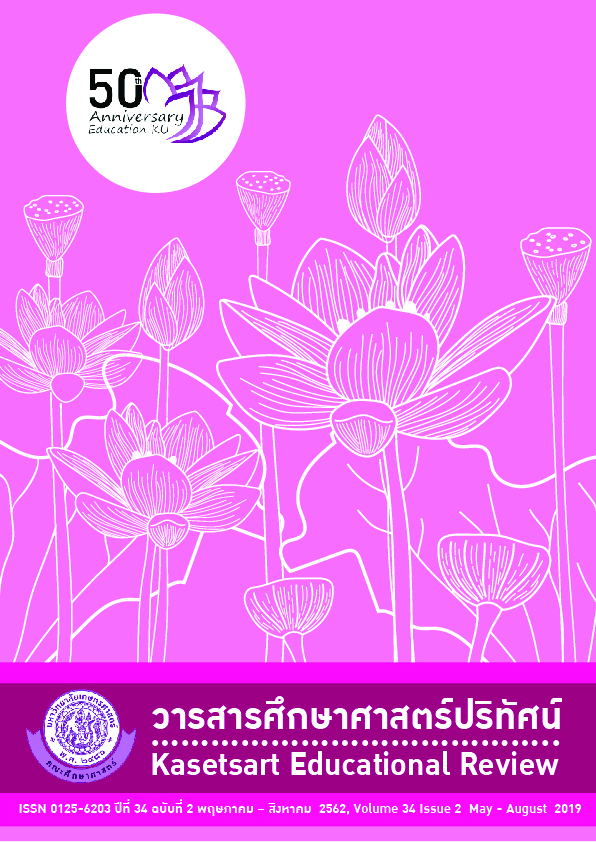การพัฒนาทักษะการให้เหตุผลเชิงวิทยาศาสตร์และจิตวิทยาศาสตร์ โดยใช้รูปแบบการจัดการเรียนรู้แบบสืบเสาะที่ขับเคลื่อนด้วยกลวิธีการโต้แย้ง เรื่อง น้ำและวัฏจักรของน้ำของนักเรียนชั้นประถมศึกษาปีที่ 5 จังหวัดภูเก็ต
คำสำคัญ:
การจัดการเรียนรู้แบบสืบเสาะที่ขับเคลื่อนด้วยกลวิธีการโต้แย้ง, ทักษะการให้เหตุผลเชิงวิทยาศาสตร์, จิตวิทยาศาสตร์บทคัดย่อ
การวิจัยครั้งนี้มีวัตถุประสงค์ 1) เพื่อพัฒนาทักษะการให้เหตุผลเชิงวิทยาศาสตร์ของนักเรียนระดับชั้นประถม ปีที่ 5 โดยใช้การจัดการเรียนการสอนแบบสืบเสาะร่วมกับกลวิธีการโต้แย้ง เรื่อง น้ําและวัฏจักรของน้ํา 2) เพื่อพัฒนา จิตวิทยาศาสตร์ของนักเรียนชั้นประถมศึกษาปีที่ 5 โดยใช้การจัดการเรียนการสอนแบบสืบเสาะร่วมกับกลวิธีการ โต้แย้ง เรื่อง น้ําและวัฏจักรของน้ํา และ 3) เพื่อศึกษาแนวปฏิบัติที่ดีในการจัดการเรียนรู้แบบสืบเสาะที่ขับเคลื่อนด้วย กลวิธีการโต้แย้งที่ช่วยพัฒนาทักษะการให้เหตุผล เชิงวิทยาศาสตร์กลุ่มที่ศึกษา นักเรียนระดับชั้นประถมศึกษา ปีที่ 5 ภาคเรียนที่ 2 ปีการศึกษา 2560 จํานวน 16 คน เครื่องมือที่ใช้ในการวิจัย ได้แก่ แผนการจัดการเรียนรู้แบบสืบเสาะที่ขับเคลื่อนด้วยกลวิธีการโต้แย้งเรื่อง น้ําและ วัฏจักรของน้ํา แบบวัดทักษะการให้เหตุผลเชิงวิทยาศาสตร์และแบบวัดจิตวิทยาศาสตร์ การวิเคราะห์ข้อมูลใช้ ค่าความถี่และการวิเคราะห์แบบอุปนัย
ผลการวิจัยแสดงให้เห็นว่า 1) หลังการจัดการเรียนรู้ แบบสืบเสาะที่ขับเคลื่อนด้วยกลวิธีการโต้แย้ง นักเรียนทุกคนมีการพัฒนาทักษะการให้เหตุผลเชิงวิทยาศาสตร์สูงขึ้น โดยเฉพาะด้านการให้เหตุผลแบบสมมตินัย และการให้เหตุผลแบบนิรนัย 2) หลังการจัดการเรียนรู้แบบสืบเสาะที่ขับเคลื่อนด้วยกลวิธีการโต้แย้ง นักเรียนทุกคนมีจิตวิทยาศาสตร์สูงขึ้น โดยเฉพาะความใจกว้าง ความเพียร พยายามมุ่งมั่น ความร่วมมือช่วยเหลือและการมีเจตนาที่ดีต่อวิทยาศาสตร์
เอกสารอ้างอิง
Berland, L.K. & Reiser, B. J. (2011). Classroom Communities’ Adaptations of the Practice of Scientific Argumentation. Science Education, 95, 191-216.
Kemmis, S. & McTaggart, M., Eds. (1988). The Action Research Planner. Victoria, Australia: Deakin University.
Krathowhl, D. R., Bloom, B.S. & Masia, B.B. (1964) Taxonomy of Education Objectives, the classification of educational goals Huandbook II: Affective Domain. New York: McKay.
Kolsto, S. D. (2001). Science literacy for citizenship: Tools for dealing with the science. Science Education, 85(3), 291-310.
Kuhn, D. (1993). Science as argument: Implications for teaching and learning scientific thinking. Science Education, 77(3), 319-337.
Lawson, A.E. (2009). Basic inferences of scientific reasoning, argumentation, and discovery. Science Education,94(2), 336-364.
Luecha L. & Ladapa, S. (2013). Fourth grade students’ scientific reasoning. Naresuan University Journal,21 (3). [In Thai]
Ministry of Education. (2010). Education Act National, 1999 and Amended (No.2nd), 2002. And (NO.3), 2010. Bangkok: Teacher Council Lardprao. [In Thai]
Nalinee, S. (2018). The Development of Grade Tenth Students’ Scientific Reasoning Ability through Argument -Driven Inquiry. Master Thesis of Education, Kasetsart University. [In Thai]
Organization for Economic Cooperation and Development [OECD]. 2013. PISA 2015: Draft Science Framework. Retrieved from http://www.oecd.org/pisa/pisaproducts/Draft%20PISA%202015%20Science%20Framework%20pdf.
Partnership for 21st Century Skills. (2007). Framework for 21st century learning. Retrieved from http://www.p21.org/storage/documents/docs/P21_framework_0816.pdf.
Panisara, S. (2017). The Development of Scientific Argumentation Skills of Grade 10 Students through the Integration of Argumentation into Problem-Based Learning in Natural Resources and Environmental Issues. Mater Degree thesis of Education, Kasetsart University. [In Thai]
Pattharawan, C. (2015). An Action Research on Enhancing Grade 10 Student’s Scientific Reasoning Ability In Learning the Topic of Stoichiometry using Argument Driven Inquiry Model. Master Degree thesis of Education, Naresuan University. [In Thai]
Sirinoot, K. (2017). The Development of Grade 11th Students’ Scientific Reasoning Ability by Using Inquiry-based Learning. Master Degree thesis of Education, Kasetsart University. [In Thai]
Sampson, V., J. Grooms. & J. P. Walker. (2010). Argument-Driven Inquiry as a way to help student learn how to participate in scientific argumentation and craft Written Arguments: An Exploratory Study. Science Education, 95(2), 217-257.
Santichai, A. (2010). Effects of biology instruction using the argument-driven inquiry instructional model on ability in scientific explanation making and rationality of upper secondary school students. Master Degree thesis of Education, Chulalongkorn University). [In Thai]
Walker, J., V. Sampson. & C. Zimmerman. (2011). Argument-driven inquiry: An introduction to a new instructional model for use in undergraduate chemistry labs.Journal of Chemical Education, 88(10), 1048-1056.
ดาวน์โหลด
เผยแพร่แล้ว
ฉบับ
ประเภทบทความ
สัญญาอนุญาต
บทความทุกบทความเป็นลิขสิทธิ์ของวารสารคณะศึกษาศาสตร์ มหาวิทยาลัยเกษตรศาสตร์ วิทยาเขตบางเขน
วารสารศึกษาศาสตร์ปริทัศน์ (Kasetsart Educational Review)






